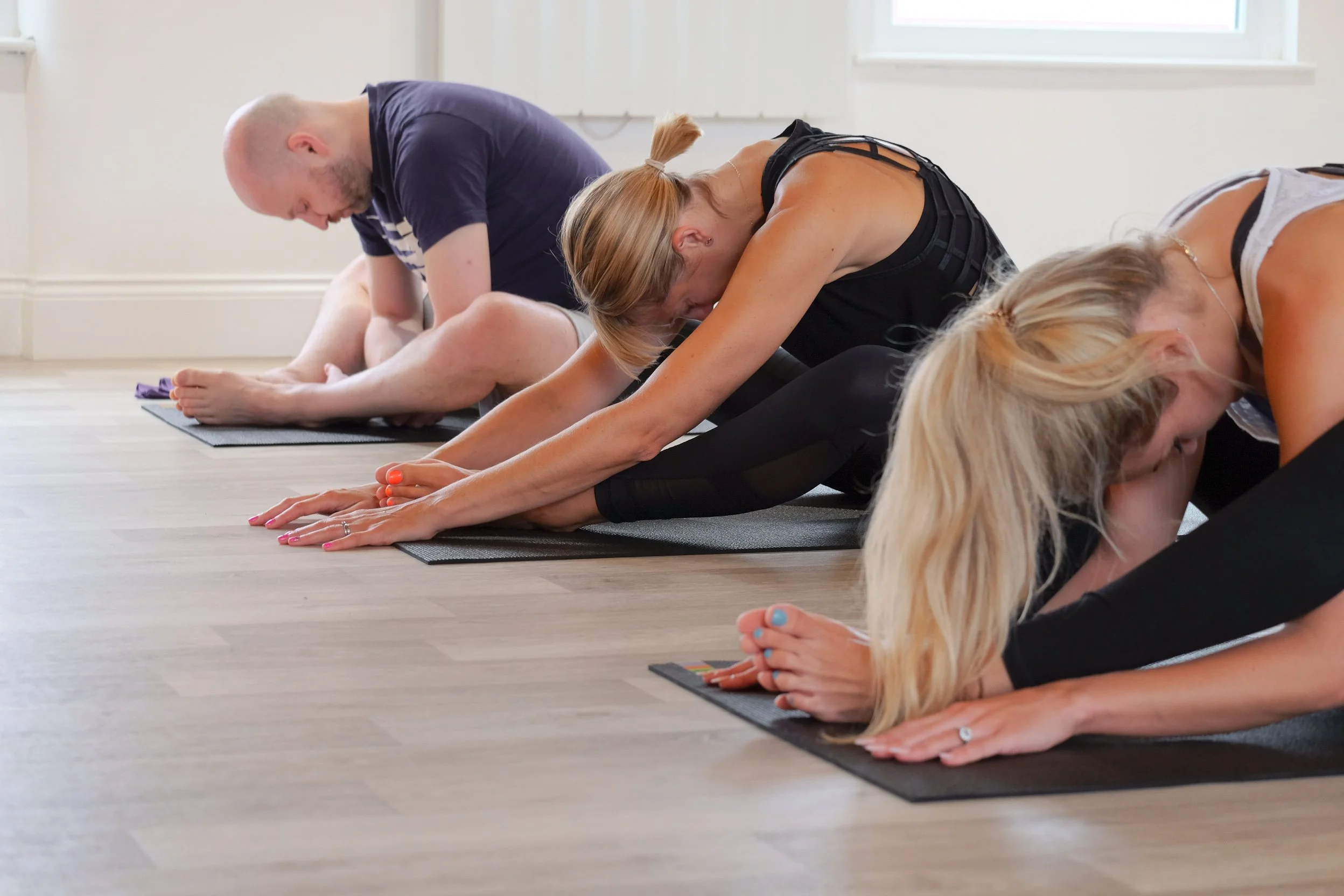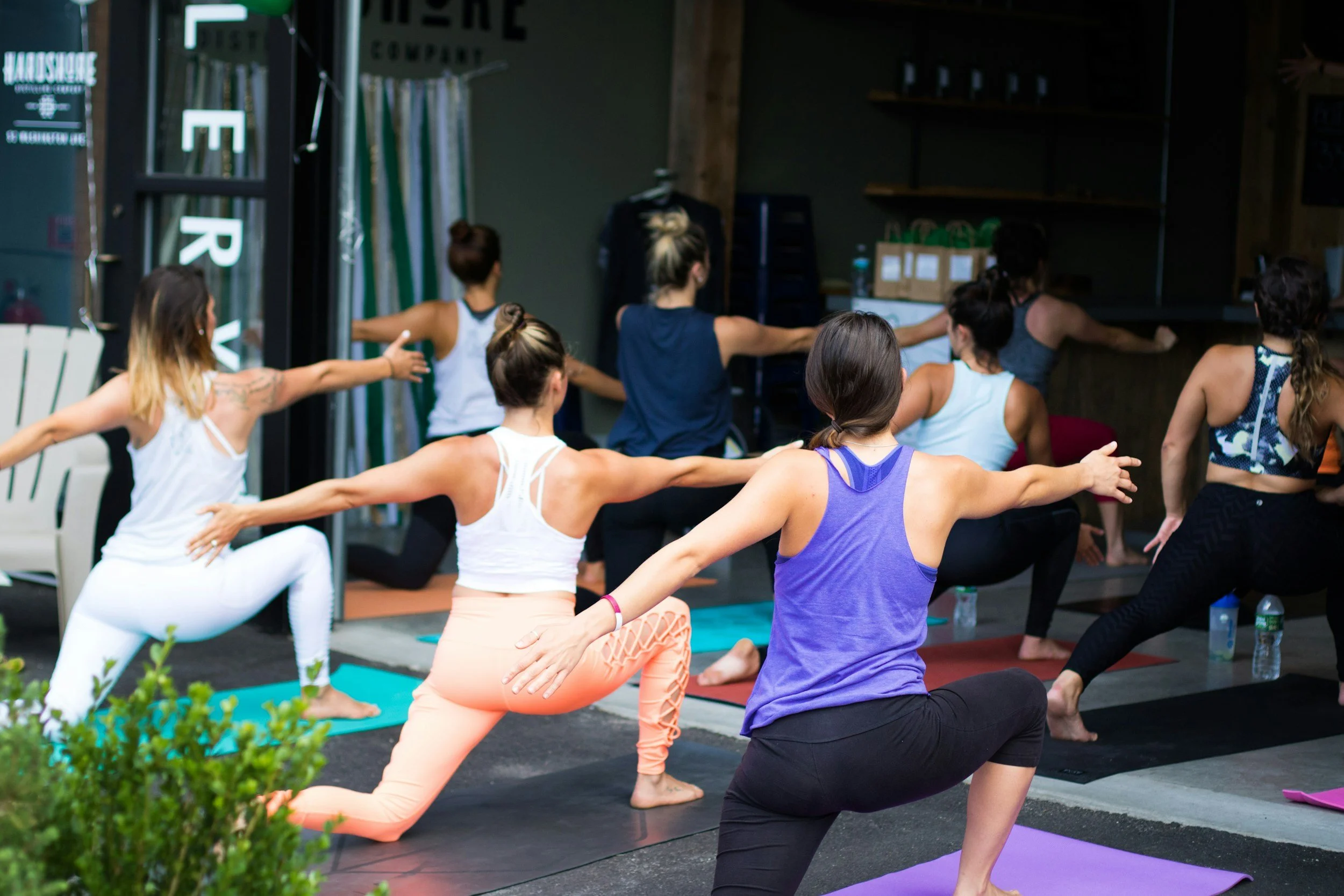Yoga Teacher Training is changing…
…every year we have students who’d love to attend the teacher training but struggle to take the time off work. We have people who are interested in exploring more yoga but don’t want to teach. And we have those who can’t wait to teach yoga and share the practice they love. We’ve been working hard behind the scenes and we think we’ve got you ALL covered…
Five separate modules, done your way!
If you want to teach yoga, all five modules are compulsory. However, if you’re looking to learn more but have no interest in teaching, simply attend one of the study weekends from modules one to three that takes your fancy…
Module One
-
Historical Origins: Ancient texts and key figures in yoga history.
Core Principles: Yamas and Niyamas, the ethical guidelines.
Philosophical Schools: Overview of different yoga philosophies (e.g., Patanjali's Yoga Sutras, Vedanta).
Mind-Body Connection: The role of meditation and mindfulness.
-
Energy Systems: Explanation of nadis (energy channels) and prana (life force).
Koshas: The five layers of human existence (physical, energy, mental, wisdom, and bliss bodies).
Bandhas: Energy locks used in practice to control and channel prana.
Role in Health and Healing: How the subtle body influences physical and mental health.
-
Chakra System Overview: The seven main chakras and their locations.
Attributes and Functions: Each chakra’s physical, emotional, and spiritual significance.
Balancing Techniques: Methods for aligning and activating chakras (e.g., meditation, visualization).
Impact on Well-being: How chakras influence overall health and life experiences.
-
Definition and Purpose: Cleansing techniques to purify the body and mind.
Types of Kriyas: Specific practices such as Neti (nasal cleansing), Dhauti (digestive tract cleansing), and Trataka (focused gazing).
Practice Guidelines: How to perform kriyas safely and effectively.
Benefits: Physical, mental, and spiritual benefits of regular kriya practice.Item description
Dates | 4/5th January and 11/12th January 2025
Price | £450 (early bird) / £495 (regular price)
Module Two
-
Skeletal System: Structure and function of bones and joints.
Muscular System: Major muscle groups and their roles in movement.
Nervous System: Overview of the central and peripheral nervous systems.
Impact of Yoga on Anatomy: How yoga postures affect and improve anatomical function.
-
Respiratory System: Structure and function of the lungs, diaphragm, and airways.
Breathing Mechanics: How breathing occurs, including inhalation and exhalation processes.
Breathing and Health: Effects of proper and improper breathing on physical and mental health.
-
Types of Asanas: Categories such as standing, seated, balancing, and inversion postures.
Alignment Principles: Importance of proper alignment and techniques to achieve it.
Asana as it works with your anatomy: key knowledge around skeletal restrictions
-
Meditation Techniques: Various methods like mindfulness, focused attention, and loving-kindness meditation.
Stages of Meditation: From basic concentration to deeper states of awareness and insight.
Benefits of Meditation: Physical, psychological, and spiritual advantages.
Challenges and Solutions: Common obstacles in meditation practice and strategies to overcome them.
-
Basic Techniques: Foundational breathing exercises such as Ujjayi, Nadi Shodhana, and Kapalabhati.
Physiological Effects: Impact of pranayama on the nervous system, cardiovascular health, and energy levels.
Dates | 5/6th April and 26/27th April 2025
Price | £450 (early bird) / £495 (regular price)
Module Three
-
Definition and Origins: Historical background and core principles of Hatha yoga.
Key Asanas: Fundamental postures and their variations.
Breath and Alignment: Importance of breath control and proper alignment in each pose.
Typical sequence of a Hatha yoga class, including warm-up, main poses, and relaxation.
-
Definition and Characteristics: Flow-based style linking breath with movement.
Key Sequences: Common flows like Sun Salutations and their variations.
Breath Synchronization: Techniques for matching breath with movement.
-
Definition and Principles: Passive practice focusing on deep tissue stretching and joint mobility.
Key Postures: Common Yin poses held for extended periods.
Mindfulness and Stillness: Emphasis on inner awareness and meditative qualities.
Physiological Benefits: Impact on fascia, joints, and energy flow (meridians).
-
Daily Practices: Incorporating yoga into everyday life (e.g., morning routines, mindful eating).
Diet and Nutrition: Principles of a yogic diet and its benefits.
Ethical Living: Applying the Yamas and Niyamas to daily life.
Community and Relationships: Building supportive and compassionate relationships within and outside the yoga community.
Dates | 12/13th July and 19/20th July 2025
Price | £450 (early bird) / £495 (regular price)
Module Four
Modules Four and Five can only be completed if all of the previous modules have been attended.
-
Overview: Understand the framework of a well-organized yoga class, including the purpose of each segment (centering, warm-up, peak, cool down, and closing).
Components: Explore the timing, pace, and flow of a class, how to create an arc that maintains student engagement, and methods to adapt structure for different class lengths or styles.
Application: Practice designing and teaching classes with varied structures to accommodate different student needs and levels.
-
Sequencing Principles: Learn the foundational principles of sequencing, such as anatomical progression, energetic flow, and the balance of effort and ease (sthira and sukha).
Theming: Discover how to weave a theme throughout a class to create a cohesive experience, including the use of quotes, intentions, and linking the theme to physical practice.
Practice: Create and present sequences with integrated themes, receiving feedback to refine your approach.
-
Foundations: Explore the unique needs of beginners, including common challenges, misconceptions, and how to introduce foundational poses safely.
Teaching Techniques: Learn effective communication, demonstration, and cueing strategies to support beginners in building confidence and understanding.
Progressions: Discuss how to structure a beginners’ class series, gradually introducing more complex concepts and postures as students progress.
-
Detailed Breakdown: Engage in in-depth exploration of key asanas, focusing on alignment, modifications, and adjustments for various body types and levels.
Functional Anatomy: Understand the anatomical considerations for each pose, including muscular engagement, joint safety, and breath integration.
Hands-On Practice: Participate in peer-led teaching clinics to practice giving and receiving adjustments, deepening your understanding of the asanas.
Dates | 27/28th September and 4/5th October 2025
Price | £450 (early bird) / £495 (regular price)
Module Five
Modules Four and Five can only be completed if all of the previous modules have been attended.
-
Foundational Knowledge: Learn the essentials of running a yoga business and create a business plan to recoup your costs within a year.
Marketing Strategies: Explore effective marketing techniques, such as branding, social media presence, and creating a website to attract and retain students.
Client Relationships: Understand the importance of building and maintaining strong relationships with clients, including strategies for communication, feedback, and community building.
Career Pathways: Discuss different career opportunities in yoga, from teaching in studios to running workshops, and how to navigate and grow in the industry.
-
Voice Development: Work on developing a confident and clear teaching voice, including exercises to improve tone, projection, and vocal presence.
Effective Cueing: Learn the art of clear, concise, and effective verbal cues that guide students safely and effectively through poses, considering different learning styles.
Language and Phrasing: Explore the power of language in yoga teaching, including positive phrasing, inclusive language, and how to convey complex ideas simply.
Practice: Engage in practical exercises to refine your voice and cueing, with feedback sessions to enhance clarity and effectiveness.
-
Practical Application: Gain hands-on experience by teaching full classes or segments to peers, applying the principles of class structure, sequencing, and theming.
Feedback and Reflection: Receive constructive feedback from peers and instructors to identify strengths and areas for improvement, promoting continuous growth as a teacher.
Adaptation and Flexibility: Practice adapting teaching methods in real-time to address unexpected challenges, such as varying student abilities, energy levels, and technical issues.
Confidence Building: Build teaching confidence through repetition, peer support, and guided self-reflection exercises.
-
Foundational Principles: Study the ethical principles of yoga, including the yamas and niyamas, and how they apply to teaching and personal practice.
Teacher-Student Relationship: Explore the dynamics of the teacher-student relationship, including maintaining boundaries, respect, and confidentiality.
Ethical Decision-Making: Discuss real-life scenarios and challenges in the yoga teaching profession, developing skills for ethical decision-making and professional conduct.
Social Responsibility: Understand the role of yoga teachers in promoting inclusivity, diversity, and accessibility within the yoga community and beyond.
Assessment will also be included in this weekend.
Dates | 15/16th and 22nd/23rd November 2025
Price | £450 (early bird) / £495 (regular price)
Pricing
Module Prices
Early Bird Price | £450 valid up to two months prior to module start date
Full Price | £495 payment plans available
Full Course Prices
Early Bird Price | £2,150 valid up to October 31st 2024
Full Price | £2,400 payment plans available
On completion of each module you will receive a certificate of participation. On completion of all five modules you will be qualified to teach vinyasa yoga and can register at the 200 hour level.
FAQs
-
A | For modules one to three there are no strict prerequisites however, a regular yoga practice (of any style) would be an advantage.
If you intend to do the teacher training modules a minimum of two years practice is required.
-
A | Yes, if you don't initially set out to teach but find that you're enjoying the modules then you're welcome to take the teaching modules. This is providing you've done the three previous modules and meet the initial prerequisites.
-
A | Yes, payment options are available for all full price modules and the course as a whole. Early bird offers must be paid in full.
Here’s what our trainees say…
-

"I can honestly say it changed my life! An outstanding teacher training course which I would highly recommend."
-

"This was more than just a learning experience. It gave me a completely different perspective on myself and yoga. "
-

"The course was structured in a way that meant I could still work and ultimately take the plunge into full-time yoga teaching."







